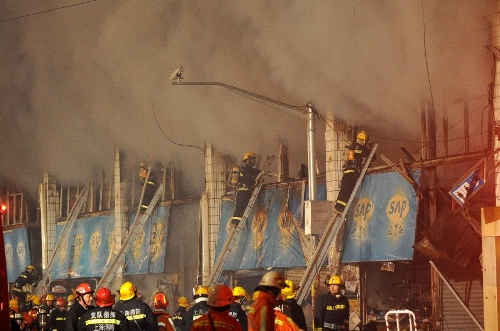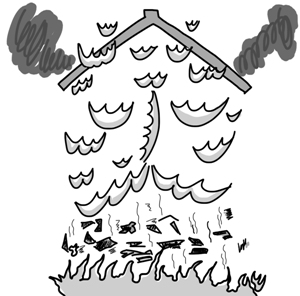Why safety remains a burning issue

A fatal fire at one of Shanghai's largest farm product wholesale markets in Pudong New Area last weekend has dealt a heavy blow to the reputation of the city's safety inspection bodies at all levels.
Five people were pronounced dead and another 14 are still getting hospital treatment after receiving horrific burns in the blaze. Several of the injured are in a critical condition.
Long before the tragedy, the market was full of prominent posters warning that a so-called "trade, live and storage," three-in-one lifestyle would not be permitted on the premises, precisely because of safety concerns. However, it now appears that this rule was largely ignored and that traders who did business in the market were also living there with their families in makeshift accommodation.
No private electrical appliances such as water heaters or rice cookers were allowed in the market, the posters also warned, adding that no loose wires should be visible in the shop stalls. But journalists reported that prohibited electrical appliances and loose wires were everywhere to be seen in the market.
And although every shop stall was equipped with a fire extinguisher, no one actually used one when the fire broke out. One stall owner told media that he buys an extinguisher every year but has no idea how to use it.
From the above facts, it now appears that a tragedy of this magnitude was waiting to happen.
That there are serious management loopholes in the running of the market hardly needs stating. And I believe a number of hard lessons need to be learned from the tragedy.
It shouldn't simply be the job of market managers to collect management fees, distribute fire extinguishers and put up posters that everyone ignores.
They should invite firefighters to help organize fire drills and to teach traders how to use the fire extinguishers correctly. And they shouldn't turn a blind eye to illegal wiring and prohibited electrical appliances.
The strict enforcement of orders and bans should never be neglected as far as public safety is concerned and severe punishment must be imposed on anyone violating such regulations.
Individuals need to assume responsibility for carrying out the duties they have been assigned.
And government departments, at all levels, need to set up long-term supervisory systems to monitor and guide every industry and field under their jurisdiction. Any misconduct needs to be quickly identified and dealt with. It is never too late to take positive action in this regard.
Another aspect of the tragedy has provided further fuel for the ongoing debate about "money versus life."
Despite being persuaded not to, one trader at the weekend rushed back into the burning building to retrieve a stash of cash he had hoarded on the upper deck of his stall. His body was later recovered by firefighters, bundles of bank notes still clenched in his fists.
Witnesses and friends of the man had plenty of time to reflect on what they would have done if faced with such an agonizing dilemma. They know all too well how much hard work and sweat has gone into building up such a large amount of savings. They pondered that it would be hard to amass a similar amount of money again from scratch. But, as others ruefully noted, it's even harder to revive a lifeless body.
The fire should be a lesson to everyone who places money above all else in this world. Life without money may be hard; but money without life is the ultimate tragedy.
